Like millions of kids in the 1990s, my first experience with puzzle-adventure games was Myst. The jaw-dropping graphics and cryptic storytelling lit my imagination, but my young age, the extreme obtuseness of the game’s puzzles, and the gameplay’s intense loneliness squelched that flame. Thirty years later, as I reach the halfway point of Epyka, I suddenly realize I’m playing the game I always wanted Myst to be.
But Epyka is not perfect. While its strengths far outweigh its one major weakness, I do have one unavoidable complaint.
What is it?: A first-person puzzle-adventure starring an archaeologist and his lovable dog.
Platforms: Meta Quest (reviewed on Quest 2)
Release Date: Out now
Developer: Singular Perception
Price: $9.99
The Premise
Epyka is a VR puzzle-adventure game in which players assume the role of Scott Hudson, an archaeologist following in his father’s footsteps on a quest to discover the secret of Earth’s first civilization. Scott’s accompanied by his faithful (and very cute) dog, Jack.
The journey begins with Scott and Jack stuck in the doldrums, lost at sea, floating hopelessly on a makeshift raft. Things get worse when sharks begin circling the boat. Rummaging through our ineffectual belongings brings no joy, until we grab a mysterious crystal, an artifact of the lost civilization and former possession of Scott’s father. The crystal glows, inexplicably harnesses the wind, urging our boat toward a tropical island that’s materialized in the near distance. We make land, and the exploration begins.
Before the end, we’ve encountered a spirit of the ancient civilization, discovered how the ruinous past may destroy mankind’s present, and entered an inevitable showdown with a demon of the underworld. Things get real, very quickly.
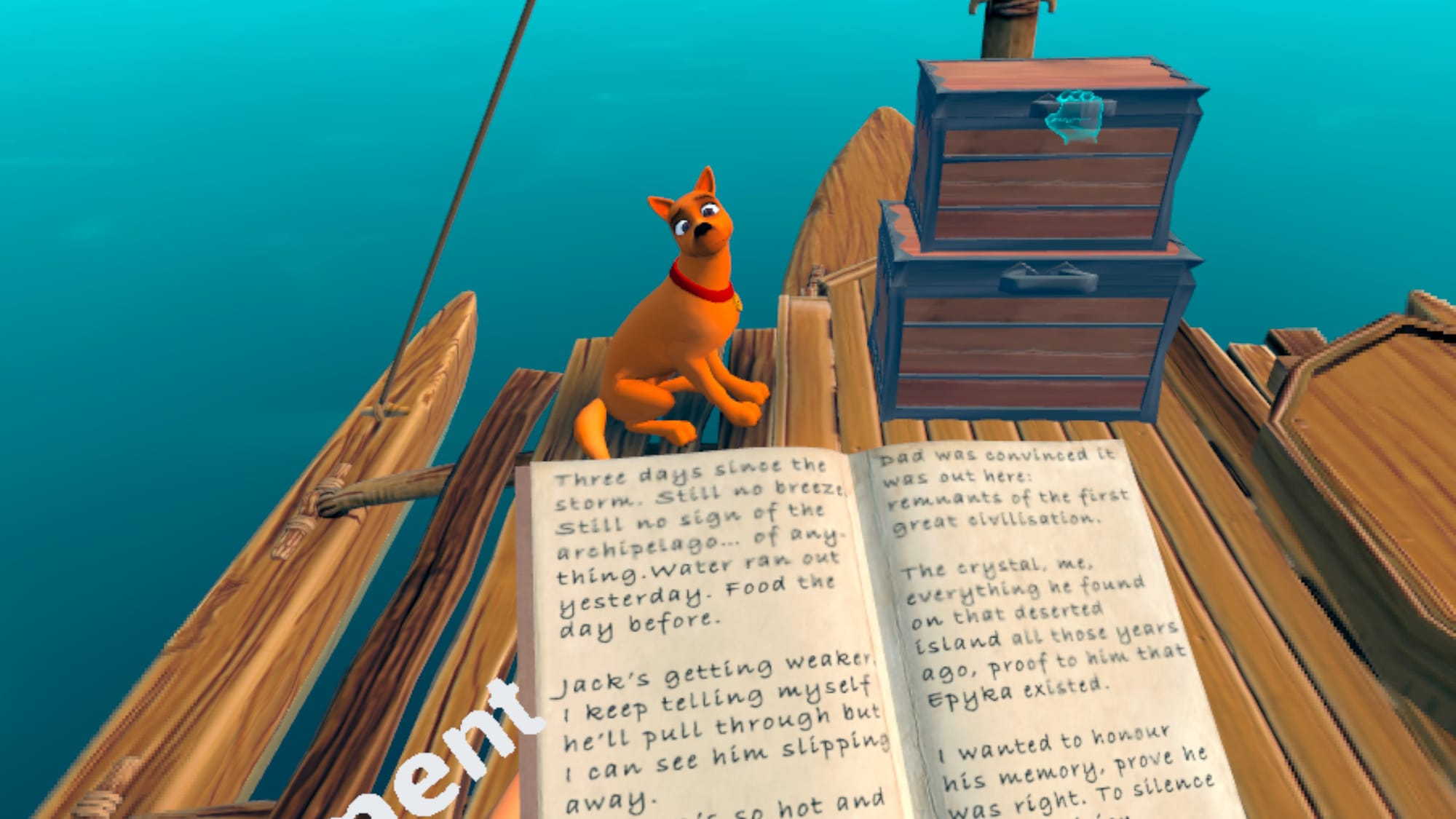
Sights and Sounds
Epyka is a beautiful game. It eschews hyperrealism for something closer to a Pixar film, with characters and locations having a softness, vibrancy, and whimsy that’s refreshing and warm. The environments are richly detailed and intelligently designed so that we’re always seeking to explore. The lighting effects are gorgeous and add to the mood beautifully, whether we’re on the sunny beach of our first island, a gloomy cave mid-game, or in the molten core of a volcano. Everything looks great.
The sound design is similarly excellent. Environmental ambience sets the mood, and some puzzles rely on audio cues for their solution. Actuating stone buttons on granite chests results in suitably crunchy grinding, the wind howls through the cliffs as we skirt a gorge, mystical artifacts hum with latent energy.
The voice acting is also wonderful, and a key component to my overall enjoyment. Where other games in this genre can feel vacant and lonely, Epyka’s developers elected to have their game’s protagonist speak his inner monologue, though he never over-speaks. In key moments, Scott will muse over the solution of a puzzle, or spare a friendly word for his dog, or chat with our friend, the guiding spirit of this ancient civilization. This effectively helps us to never feel as if we’re all alone on this journey, that there’s a friend along with us. Jack helps too, and yes, you can pet the dog.
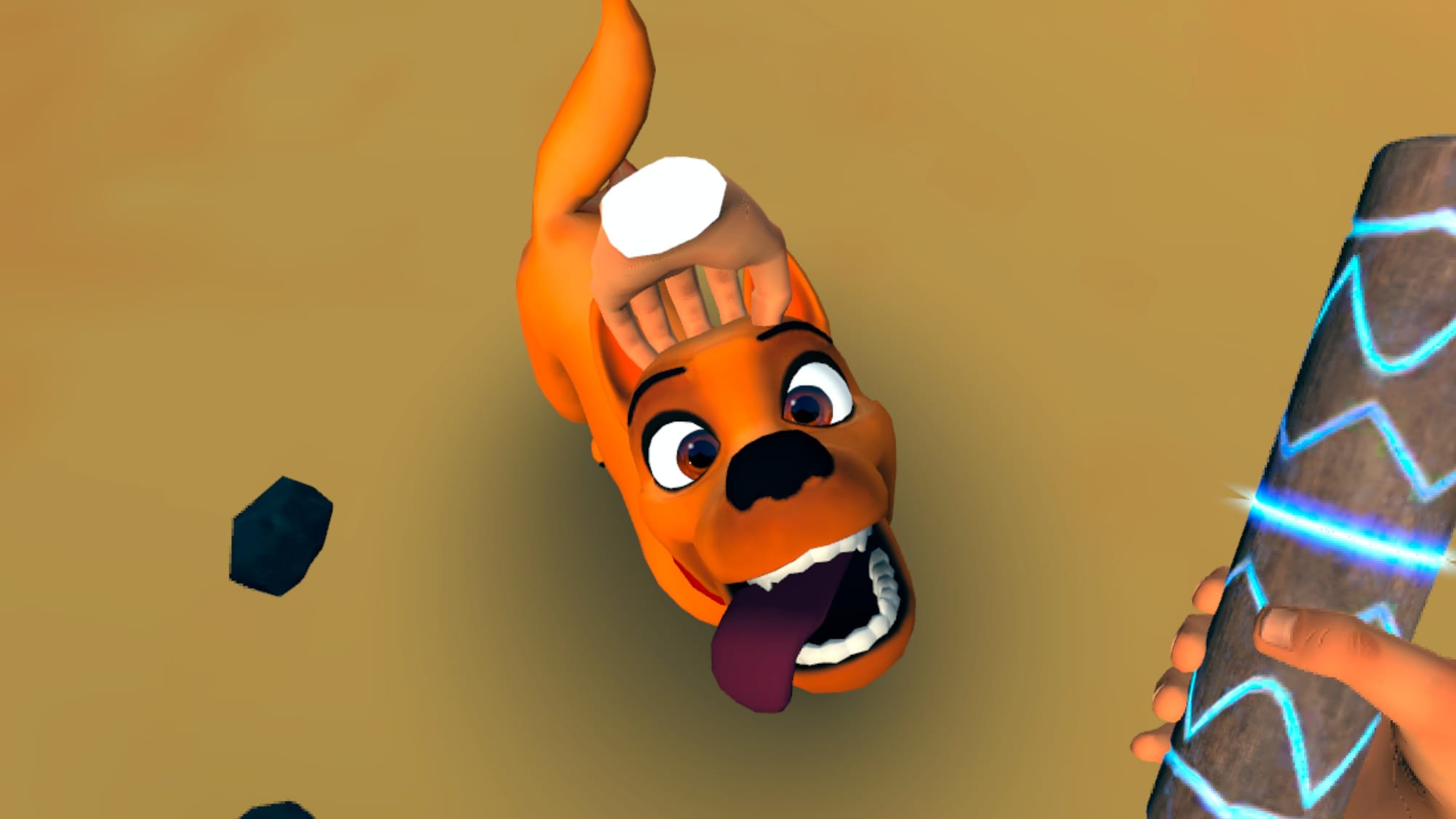
Gameplay
Epyka’s gameplay centers on exploration and puzzle-solving, as you investigate the titular lost civilization’s suddenly materialized ruins. We pass from location to location, usually solving puzzles along the way so we might progress further and deeper into this island and its ruins.
The puzzles are designed to test our problem-solving skills and often involve manipulation of magical objects or our environment. This includes fitting floating orbs into a scepter in the correct order to open a door, or piecing together irregular geometric cube shapes to form a larger, uniform cube.
Many of the game’s best puzzles involve miniature models representative of the real world around us. In one early puzzle, we manage to find our way into the center of a circular maze. In the middle, we find a small model of the very maze that we just navigated. However, this small model has movable walls and doors, and only by manipulating these walls and doors can we find our way to the true endpoint of the maze.
The joy of Epyka is that the puzzles never feel obtuse or frustrating, they always seem to make sense. They’re logical, not in a video-gamey way, but in a common sense way. My immersion was never broken. I never once thought, “What do the game designers want me to do here?” I only thought, “What am I missing here, how do I solve this magical puzzle?”
That’s good design.
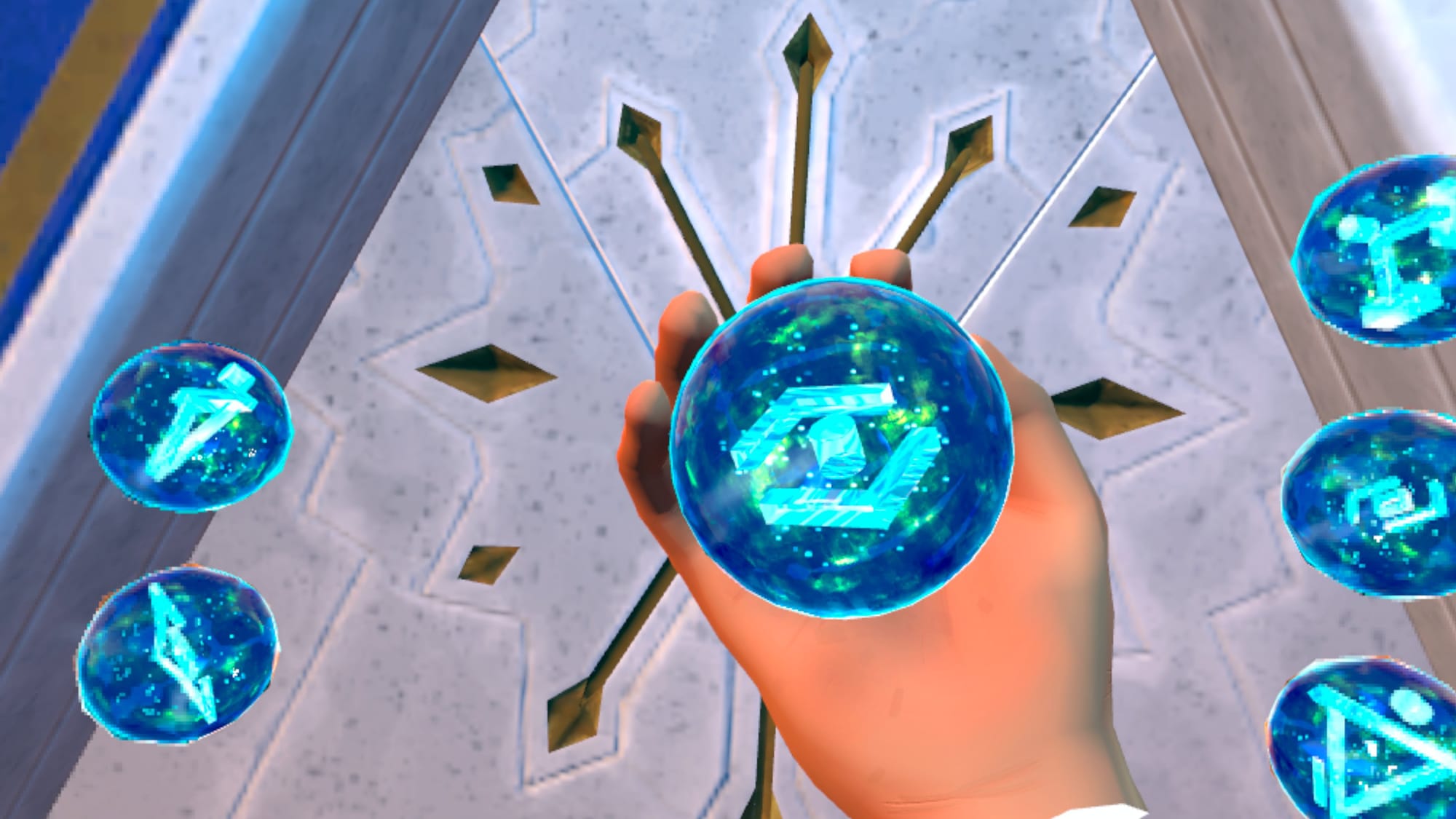
As we progress through the game, Scott’s famous crystal acquires magical abilities. By pointing the crystal at certain objects, we’re able to tether to them and drag them about the game field. We can also use movement and momentum to toss these objects. We’re building bridges with boulders, opening enormous stone doors, and even hurling stones to shatter walls.
A second ability is a magical shield, which proves useful when enemies appear. You can even use your shield offensively by returning enemies’ attacks back at them.
Combat in Epyka is an unexpected treat, and though it’s rare and light, it works well. That is, it works well until the end. The final moments of the game require your combat abilities, and this isn’t implemented very well. The sense of urgency fades a bit as clunky controls hamper the action.
Epyka offers a good range of comfort options so that virtually all players will find a comfortable mode. There’s standing, roomscale, and sitting player modes; a choice of right and left handed controls. You can also choose artificial stick-based movement or teleportation-based locomotion.
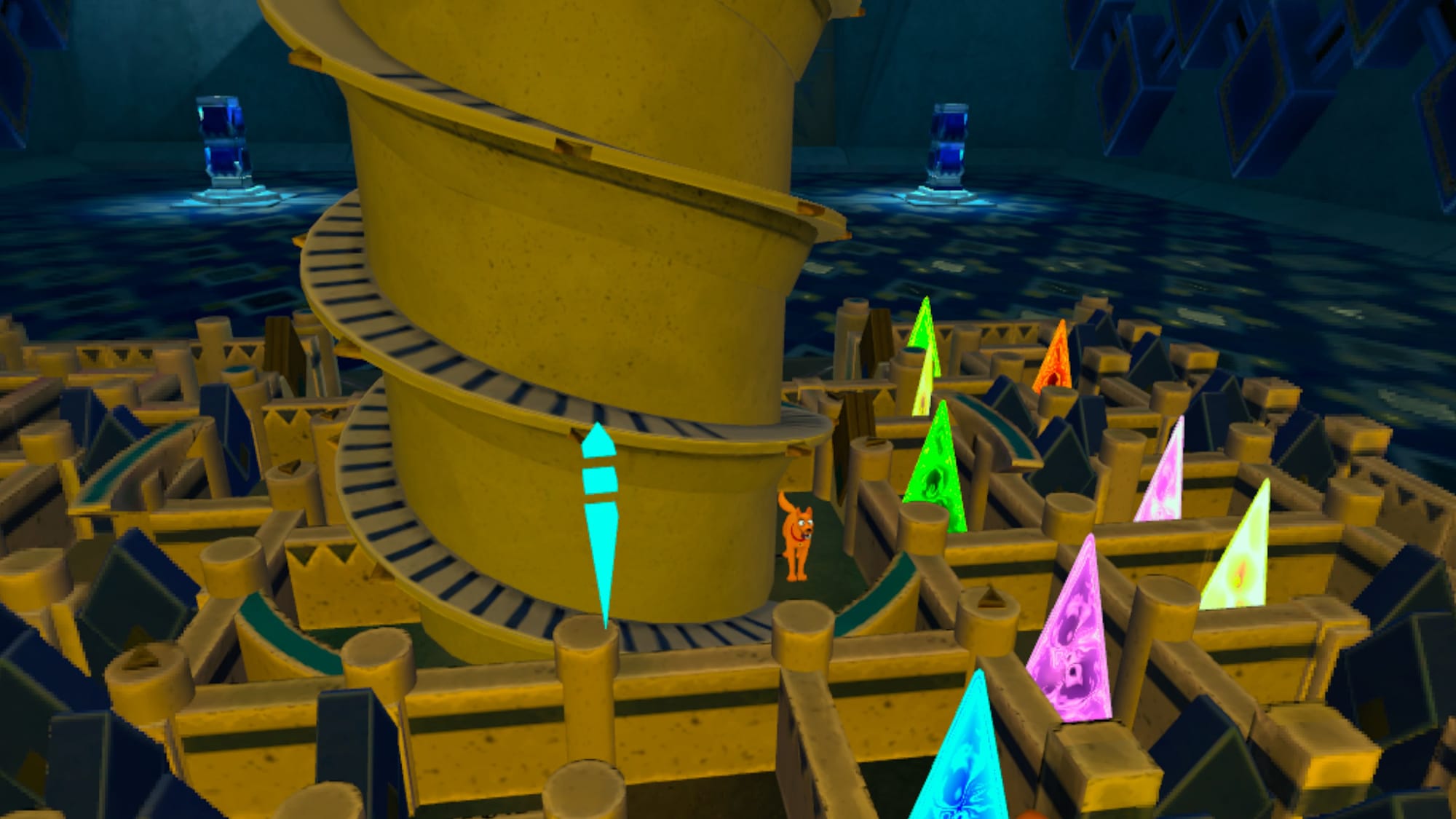
So, What’s the Problem?
At the start of this review, I alluded to Epyka’s imperfection, and that goes beyond clunky combat at the game’s climax. The fact that said climax came so soon is what really puts me off. Minor spoilers ahead in the next paragraph.
The game ends on something of a cliffhanger. Upon returning to the game’s starting area, a museum gallery shows pictures of our adventure and some of the mystical objects we’ve collected throughout. There’s a roped off section and some empty plinths, promising that there’s more Epyka still to come. The end credits alludes to a future follow-up, stating, “The End… of the beginning.”
But what exactly does this mean? When asked about its future plans following this ending, Singular Perception informed UploadVR that its intention, “is to expand the story through DLCs and sequels.” Further specifics were not provided.
My playthrough took three hours to complete, which is not terribly short, considering that Myst can be beaten legitimately in about five hours. But the abrupt, almost attenuated way that Epyka’s narrative unfolds leaves us wanting more; more answers to the game’s many questions, more interaction with the game’s central characters, more exploration of what is undeniably a vibrant and lore-lush world.
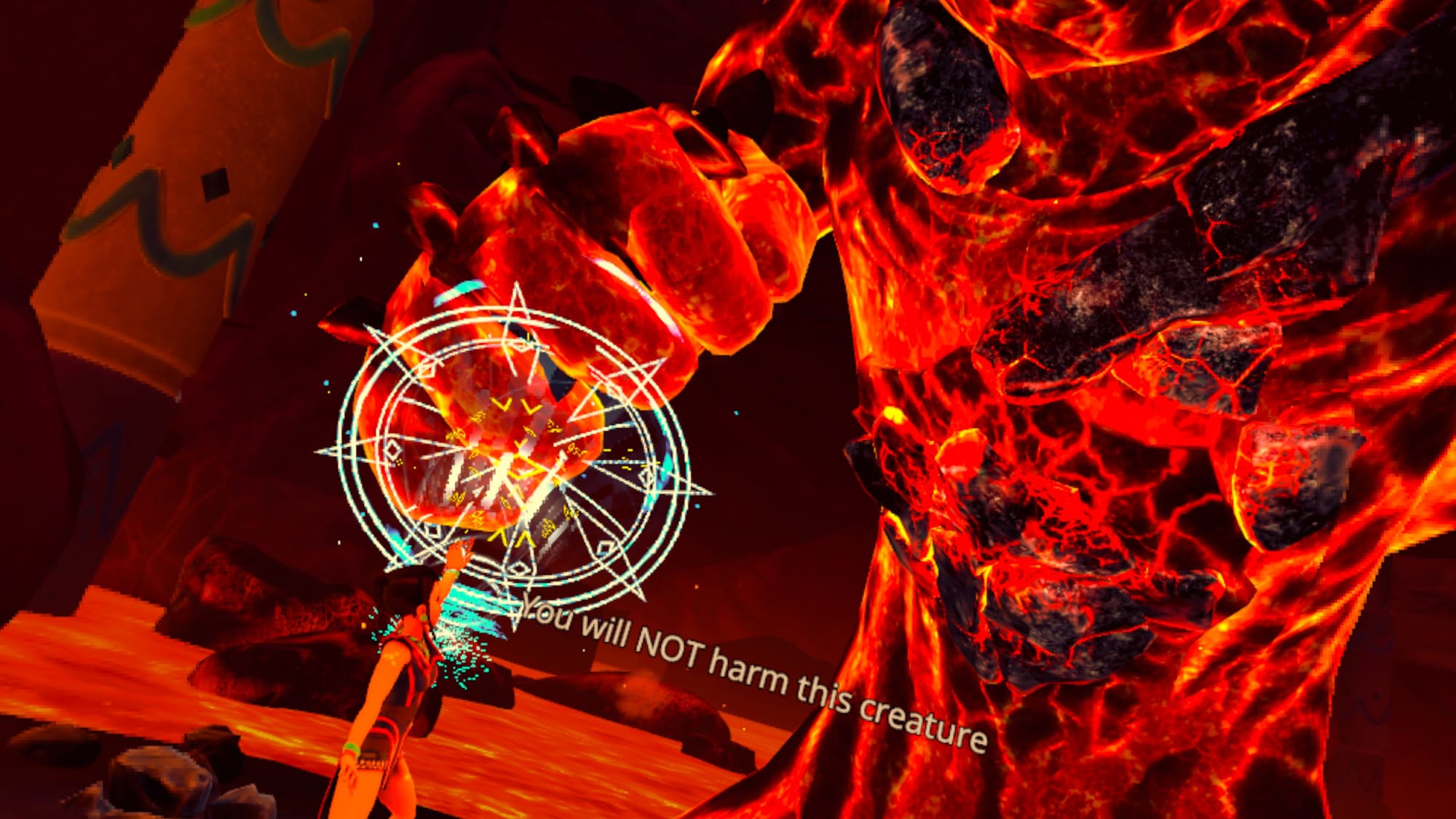
Epyka Review – Final Verdict
Epyka is a beautiful entry point for first-time puzzle-adventure gamers, and a breath of fresh air for adventure game veterans seeking a lighter, well-crafted experience. Its compelling narrative, challenging but fair puzzles, and the companionship of the game’s few NPCs make Epyka exactly the game that I wished MYST was when I was ten years old. Given my ten-year-old daughter’s joy when she donned the headset and patted Jack for the first time, I think she agrees. We only wish the game was longer.

UploadVR uses a 5-Star rating system for our game reviews – you can read a breakdown of each star rating in our review guidelines.
This review was updated shortly after publication to reflect Singular Perception’s statement to UploadVR about its future plans for Epyka. For full transparency, the entire response can be found below:
“Epyka is a roughly 3-hour experience, though the playtime may vary depending on your familiarity with puzzle games. As a small indie studio, we’ve poured our heart and soul into creating Epyka, focusing on delivering a polished and memorable journey rather than extending the length for its own sake. The game’s shorter length is also reflected in its low price, ensuring value for the experience it offers.
“Our intention is to expand the story through DLCs and sequels, guided also by feedback from the community.”
